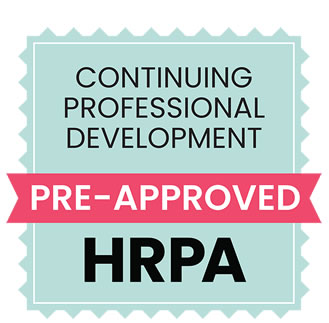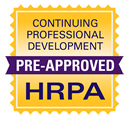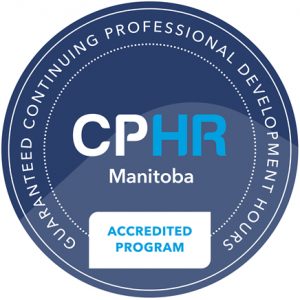Veuillez voir ci-dessous pour une traduction en français.
- Counsel War Crimes. Department of Justice Canada

The program is accredited or pre-approved by HRPA, CPHRAB, CPHRBC and Yukon for 6.5 CPD recertification hours.






This course has been accredited by the LS of Ontario and LSBC for 6.50 hours each day of continuing professional development.
The program is accredited by the Institute of Internal Auditors (IIA) for 6 hours per day.
This is an amazing course. I learned so much!
- Investigations Consultant
These are truly great courses – and a lot of fun, too.
There is a lot of information on the Internet that may be relevant to your investigation – whatever kind of investigation you do. The Internet has vastly increased the quantity and breadth of information available to investigators. It has made research much faster and easier. It can help identify possible witnesses. It can provide useful background information about those involved in an investigation. You might uncover video or photographic evidence relevant to your investigation. Tweets, blogs and posted comments may shed light on something under investigation.
These courses teach how to access and preserve that information – efficiently and ethically.
The courses are very much hands-on, full of practical exercises and lots of take away information sheets. If the experience of participants on previous courses is anything to go by, you will be amazed by what you learn. Spaces are limited.
We have bundled the Internet course into two days. One day focuses on social media. The other day covers the broader Internet, including how to find information smartly and strategically. We will teach you about Open Source Intelligence (OSINT).
You can mix and match with other investigations courses we are doing. Pick a day from How to Use the Internet as an Investigative Tool programme and combine with the Fundamentals of Investigation course and/or the Investigative Interviewing course – or take them all!
Here’s what we will cover:
Day 1
Using the Internet as an Investigative and Research Tool
Part 1 – The World Beyond Social Media
This full-day course introduces you to the proper techniques to navigate and recover information from the World Wide Web.
- Search Techniques and Methodology Content includes how to search the web smartly and strategically. We cover the most effective and fruitful approaches and set out a proven methodology, using search strategies with web-based tools.
- Search Engines and Directories This session teaches you how to use the most popular web searching tools to your advantage. We discuss the world beyond Google – those more obscure tools that may be the key to finding information relevant to your investigation – from reverse search engines to public databases that contain a cornucopia of information – if you know where and how to look.
- Recovering Lost Sites This session deals with the recovery of sites no longer operating, from the numerous major online archives and various tools that cache data. We cover how to think strategically when leveraging data, with online exercises to reinforce the lessons learned.
- Web Names (Domains) This session explains the structure of site names, how they are registered and what information on the registrations is in the public realm. Additional material focuses on how to identify other sites on the same host computer IP number, finding additional related sites to targets through thought process and online tools that allow person and entity name searches for web site registrations.
- Invisible Web This session covers how to access and recover data from online data bases located across the world. Included is a list of links to gateways of high-quality databases. We address privacy concerns and ethics. We also provide an overview of business, corporate and property registrations systems.
- Using the Internet as an Investigative and Research Tool Outcomes
- You will know how to:
- Search the web smartly and strategically
- Use the most popular web search tools to your advantage
- Recover sites no longer operating
Day 2
Using the Internet as an Investigative and Research Tool
Part 2 – Social Media
Twitter, Facebook, LinkedIn, YouTube– and many more. Social media contain a wealth of information that might be of use to you – if you know how and where to look for it. This full-day course will cover how to use Internet social networks to further your investigation. We will cover:
- how to use search tools associated with social media
- strategic search tools for finding people,
- how to find information on social media, including specialized searches on tracking postings and photo searching.
- identifying individuals associated with a given e-mail address.
This is an exercise-based course – with practical examples and techniques that will have you digging deeper into the Internet as the day goes on. The course will give you the skills to mine social media networks for information relevant to your investigation – effectively and ethically.
It was all relevant. Very good approach
- Director General. Canada Revenue Agency
You will be on-line throughout the day on both days, learning the techniques by actually doing them. It’s proactive, practical and fun.
Using the Internet as an Investigative and Research Tool: Social Media Outcomes
You will know how to:
- use search tools associated with social media
- use strategic search tools for finding people,
- find information on social media, including specialized searches on tracking postings and photo searching.
- identify individuals associated with a given e-mail address.
Instructors
A very enlightening day – learned lots. The course opened up my world on search options/methods.
- Supervisor. Ottawa Paramedic Service
Andy Phillips was a member of the Royal Canadian Mounted Police (RCMP) for twenty-five years, over 20 years of which was spent investigating financial crimes. He retired from the RCMP in 1997 and spent two years working within the banking and insurance industry.
Andy’s focus since 1999 has been the Internet and its use for investigations. In September 2008 he set up his own consulting business and now works and consults for various Federal and Provincial government agencies in Canada. He has testified in court in respect of evidence from the Internet, and in 2009 was qualified as an expert on Internet Open Source Collection in General Division Court in Montreal in a national security matter.
Andy has created and delivered courses on using the Internet as an investigative tool to administrative investigative agencies, regulators and law enforcement in Canada, the United States, Europe, the Middle East, Africa, Southeast Asia, Australia and Latin America.
Daniel Bertrand is a retired officer from the Royal Canadian Mounted Police (RCMP), where he dedicated 30 years and worked in several provinces and internationally, including a tour of duty with the United Nations Peace Keeping Operations. He worked in municipal, provincial and federal policing services, and has extensive experience in criminal intelligence and investigations related to serious and organized crime, and national security. During the course of his career with the RCMP, he conducted cyber crime based investigations, including dealing with digital evidence for intelligence and investigations, and he is very knowledgeable with different computer programs and how to use them to analyze, record, archive and store digital media and information.
Post retirement, Daniel started a second career as a consultant. As a contractor, he provides specialized support, training, and guidance on social media and open source intelligence, designs and customizes policies, directives, and guidelines, as well as performs training. He also conducts interview and investigations for private and public sector agencies in both official languages.
Daniel is currently working with a federal government agency based in Gatineau, Quebec. Using his previous experience and skills, while continuing to develop his knowledge of new software and technology, he provides specialized computer investigative support. He does this by facilitating the ongoing development of current and new information management procedures and practices, and trains and supports analysts, investigators, and legal team members who use computer-based investigations and open source / social media intelligence.
In addition to his career in investigations and intelligence, Daniel enjoys teaching and coaching others on how to use technology. His extensive teaching experience includes instructing investigators and senior police at the Canadian Police College, lecturing at the British Columbia Institute of Technology (BCIT), and presenting at multiple forums within Canada and internationally. Daniel continues to develop his skills and recently completed a course on Artificial Intelligence at the Massachusetts Institute of Technology (MIT).
Paul Couture was a member of the Royal Canadian Mounted Police (RCMP) for more than 29 years, of which most was spent investigating organized crime, money laundering and national security related offences in Canada and abroad. Since 2002, Paul has used the Internet as an investigative tool and has developed a broad expertise in this field. In 2009 Mr. Couture was declared an expert witness on Internet Open Source Collection in the Criminal Division Court in Montreal, Quebec in a National Security matter.
Mr. Couture was selected in 2010 as the head of the international liaison office for the RCMP, deployed for 4 years to the Canadian Embassy in Berlin and had diplomatic responsibilities for law enforcement relations and investigations involving 6 countries including Germany, Switzerland, Austria, Poland, Czech Republic and Lichtenstein.
Upon his return to Canada in 2014, Paul was named Head of Operations for the Tactical Internet Open Source (TIOS) unit at RCMP National Headquarters. He was involved in several high priority investigations that required in depth online research. Mr. Couture also provided training on the use of the internet as an investigative tool to local and foreign law enforcement agencies in Canada and abroad including in Morocco and Bangladesh.
Paul was a member of TIOS for over 7 years before retiring in 2017 and setting up his own consulting business, providing research and training in the use of the Internet as an investigative tool, while keeping current with the fast-changing environment of Cyber World including social media and the Dark Net.
Please contact Barb Jaworski about discounts for groups and number of days
Call 416 704 3517 or email: bjaworski@workplaceinstitute.org
Inscription
Ce programme est accrédité auprès de : HRPA, CPHRAB, CPHRBC et le Yukon pour 6.5 heures de développement professionnel et certification.
Ce cours est accrédité auprès de LS Ontario et LSBC pour 6.50 heures de développement professionnel.
Ce programme est accrédité auprès de Institute of International Auditors (IIA) pour 6 heures.
Cette formation est incroyable. J’ai appris beaucoup!
- Consultant aux enquêtes
Ces formations sont vraiment formidables et intéressantes.
Beaucoup d’informations pertinentes à vos enquêtes sont disponibles sur internet, peu importe votre domaine. Internet a considérablement augmenté la quantité et l’étendue des informations mises à la disposition des enquêteurs. Cela rend la recherche beaucoup plus rapide et plus facile et peut aider à identifier d’éventuels témoins. Le Web peut fournir des informations utiles sur les personnes impliquées dans une enquête. Vous pourriez découvrir des preuves vidéo ou photographiques pertinentes pour votre enquête. Les Tweets, les blogs et les commentaires mis en ligne peuvent mettre en lumière des informations pertinentes a une enquête.
Ces cours enseignent comment accéder à cette information et la conserver – de manière efficace et éthique.
Les cours sont interactifs, avec plusieurs exercices pratiques et de nombreuses fiches d’information à conserver. Nous fournissons les ordinateurs et un instructeur expérimenté. Si on se fie aux commentaires des participants à nos cours précédents, vous serez étonnés par ce que vous apprendrez. Les places sont limitées.
Nous avons divisé la formation en deux jours. Une journée traite de l’Internet au sens large, y compris comment trouver des informations intelligemment et de façon stratégique. L’autre journée se concentre sur les réseaux sociaux. Nous allons vous enseigner les techniques de la recherche de renseignements de sources ouvertes (OSINT).
Jour 1
Comment utiliser Internet comme outil de recherche et d’enquête
Partie 1- Le monde au-delà des réseaux sociaux
Techniques de recherche et méthodologie
Les participants apprendront à utiliser une variété d’outils disponibles en ligne afin de maximiser leur habileté à ratisser large et comprendre les limites et performances de chaque outil.
Moteurs de recherche, navigateurs et répertoires.
Nous traiterons des limites des moteurs de recherche, navigateurs et autres outils de recherche ainsi que les différents résultats obtenus par chacun. Vous découvrirez de nouvelles méthodes de recherche et outils méconnus mais efficaces afin de soutirer des informations utiles qui sont dissimulées dans l’univers du Web.
Récupérer du matériel qui semble ne plus être accessible en ligne.
Comprendre les divers types d’archives disponibles en ligne offertes par les gouvernements et entreprises privées, et savoir les l’utiliser afin de récupérer des renseignement utile.
Infrastructure Internet – Domaines
Cette session permettra une meilleure compréhension des règles qui entourent l’existence des sites sur internet et l’acquisition de domaines. Nous ferons un survol qui inclura la récupération de données liées à l’enregistrement d’un domaine, informations actuelles et historiques. Les participants seront exposés aux outils de recherche spécialisés pour récupérer les informations d’enregistrement de noms de domaines tels noms adresses, numéros de téléphone et adresses courriels ainsi que la recherche d’information liée à l’adresse IP.
Web invisible
Les participants découvriront un monde sous-jacent au Web traditionnel, où des informations importantes peuvent être stockées à l’intérieur de bases de données qui ne sont pas indexées par les moteurs de recherche traditionnels.
Jour 2
Comment utiliser Internet comme outil de recherche et d’enquête
Partie 2 – Les réseaux sociaux
Twitter, Facebook, LinkedIn, YouTube et bien d’autres. Les participants seront mis au fait des risques inhérents à la recherche et l’utilisation des réseaux sociaux. Il existe un montant phénoménal d’information qui n’est pas indexé par les moteurs de recherche et pouvant être d’une valeur inestimable. La formation d’une journée touchera sur l’utilisation de lignes de commande et méthodes de recherche avancées qui incluront des données géographiques et extraction d’identifiants qui sont requis lors de demandes judiciaires.
Des exercices concrets aideront les participants à mieux comprendre comment prendre avantage des outils disponibles afin d’extraire le maximum d’information tout en respectant les paramètres de sécurité et de confidentialité des utilisateurs.
Paul Couture
M. Couture a été policier à la Gendarmerie royale du Canada (GRC) pendant plus de 29 années, dont la majorité consacrée aux enquêtes sur le crime organisé, le blanchiment d’argent et les infractions liées à la sécurité nationale au Canada et à l’étranger. Depuis 2002, M. Couture utilise Internet comme outil d’enquête et a développé une vaste expertise dans ce domaine. En 2009, M. Couture a été déclaré témoin expert en recherche de source ouvertes auprès du tribunal de la division criminelle de Montréal (Québec) dans une affaire de sécurité nationale.
M. Couture a été nommé en 2010, responsable du bureau de liaison internationale de la GRC, déployé pendant quatre ans à l’ambassade du Canada à Berlin. Il était responsable des relations avec les forces de l’ordre et des enquêtes dans 6 pays, dont l’Allemagne, la Suisse, l’Autriche, la Pologne, la République tchèque et Liechtenstein.
À son retour au Canada en 2014, M. Coture a été nommé chef des opérations de l’unité nationale de recherche tactique de source ouvertes sur internet au quartier général de la GRC à Ottawa. Il a participé à plusieurs enquêtes complexes et sensibles. M. Couture a également dispensé de la formation sur l’utilisation d’Internet comme outil d’enquête a plusieurs organismes d’application de la loi canadiens et étrangers tant Canada ainsi qu’à l’étranger; y compris au Maroc et au Bangladesh.
En 2017, M. Couture crée sa propre entreprise de consultants, se spécialisant en recherche et formation sur l’utilisation d’Internet comme outil d’enquete tout en demeurant constamment a jour sur l’environnement en constante évolution du cyber espace et du Dark Web.
Veuillez contacter Barb Jaworski pour connaître les rabais pour les groupes et sur le nombre de jours.
Previous attendees have come from:
College of Alberta Dental Assistants
Alberta Justice and Solicitor General
Canadian Food Inspection Agency
Pro-Western Mechanical
Six Nations Elected Council
Ombudsman for Banking Services and Investments
Saskatchewan Society of Medical Laboratory Technologists
UBC, Sauder School of Business
Kinark Child and Family Services
Toronto Community Housing
SGEU
Service Canada
Office of the Correctional Investigator of Canada
IIROC
Valard
Information & Privacy Commissioner Ontario
Royal College of Dental Surgeons of Ontario
University of Saskatchewan
Citizenship and Immigration Canada
Fraser Health
FedEx Canada
College of Physiotherapists of Ontario
Public Service Commission of Canada
MDE Consulting Ltd.
Nextera Energy Canada
VIHA
City of Edmonton
Canada Revenue Agency
Competition Bureau
British Columbia Securities Commission
Ontario College of Pharmacists
Law Society of Saskatchewan
Public Service Commission of Canada
Justice Canada
Michels Canada
Eastern Ontario Regional Laboratory Association (EORLA)
Insurance Councils of Saskatchewan
Ontario College of Teachers
Manitoba Hydro Electric Energy and Natural Gas
Quest University
Office of the Languages Commissioner-Nunavut
Cogeco
College of Chiropractors of Ontario
Spillett Security Group Inc
Mohawk College
WCB Alberta
Le Protecteur du citoyen du Québec
College of Pharmacists of British Columbia
Telus
GardaWorld
Ryerson University
Public Health Agency of Canada
Safety Codes Council
Ottawa Paramedic Service
Saskatchewan Transportation Company
University of Alberta
Armillary Business Group Corp
Saskatchewan Telecommunications Holding Corporation
B2B Bank
College of Physicians and Surgeons of Alberta
Office of the Commissioner of Lobbying of Canada
College of Naturopathic Doctors
Union of Canadian Correctional Officers
The Law Society of Ontario
Anchor HR Services Inc.
Corrpro Canada, Inc.
Ontario College of Trades
Canada Bread Company, Ltd.
Law Society of Alberta
Alberta College of Social Workers
United Pipeline Systems
City of Ottawa
CPA Ontario
EPCOR Utilities Inc
Federated Co-operatives Limited
Saskatchewan Workers’ Compensation Board
City of Toronto
Saskatoon Public Library
Howe Sound Pulp & Paper Corp
Nelson & District Credit Union
Jazz Aviation
Electrical Safety Authority
Farm Credit Canada
Alberta Treasury Board and Finance
….and many others